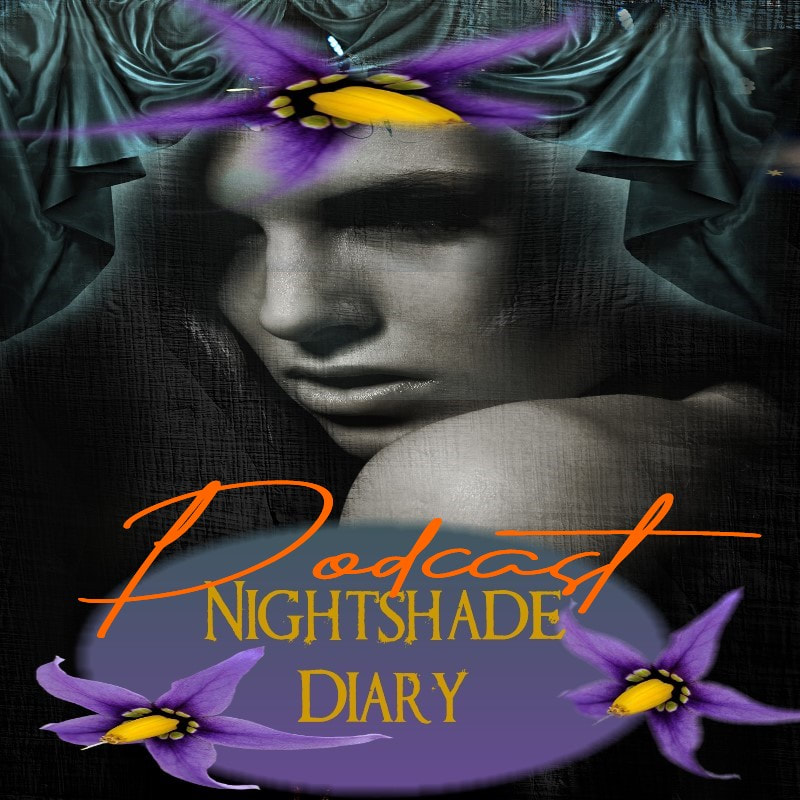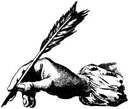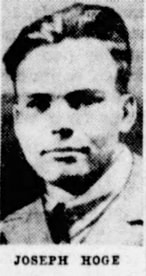 by M.P. Pellicer | Stranger Than Fiction Stories Mary Hoge's slashed body was found stuffed in a steamer trunk, and the suspect was none other than her stepson. 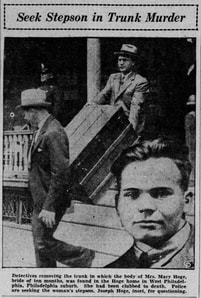 Joe Hoge disappeared after killing his stepmother Mary Hoge c.1934 Joe Hoge disappeared after killing his stepmother Mary Hoge c.1934 Jacob Hoge, 48, a baggage manager for the Pennsylvania Railroad told police that his son Joseph, 21, sat on a steamer struck while waiting for an express man to remove it. He thought it was odd, but not as odd as the fact that he couldn't find his wife. He'd only been married 10 months, and he hurried home from work like the newlywed he was. His first wife Sarah, mother of his children, had died in 1929. When Jacob Hoge found droplets of blood in his home, his suspicions were raised, and he pushed his son out of the way. Inside the trunk he found his 30-year-old bride doubled over inside. Her face and chest were slashed, and she had a hole in the base of her skull. When he turned to ask his son what happened, Joseph had disappeared. When police arrived at 5325 Parrish St., Philadelphia they found an ice pick and chisel stained with blood in the cellar. In the adjacent yard they found blood-stained clothes in a burlap bag, which turned out to belong to Joseph Hoge. At first the newspapers ran with the story that this was tragic result of a love triangle between Mary Brogan Hoge, her stepson and her husband. Joe Hogan was the eldest of five children, and the rumor was they had "kept company" before, and that Jacob Hoge had wooed Mary away from his own son. However Mary Hoge's sister, Grace Neeson said there was nothing between her sister and Joseph Hoge, and they had met once three years before. Then he enlisted in the military, and she had not seen him again until after she was married to his father. Jacob Hoge contradicted this story, and said that Joseph had asked Mrs. Hoge for money on several occasions, and when she refused him he became angry. At the coroner's inquest Jacob Hoge said that his son killed Mary Hoge, because she spurned him when he proposed that they elope together. He told police his son and wife had been involved three years before, but she broke it off when he enlisted in the Marine Corps. The following day after the body was found, Mr. Hoge found that $22 in rent money his wife had hidden was missing, along with her white pocketbook where she kept more money and the keys. The coroner found $87 sewn into a pocket of the dead woman's clothing. Hoge had been discharged from the Marine Corps three weeks before the murder. 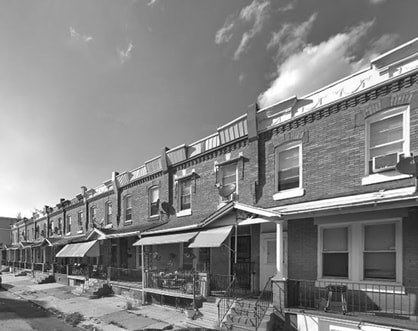 Parrish Street, Philadelphia c.2018 Parrish Street, Philadelphia c.2018 Two weeks after the crime Joseph Hoge was arrested in Washington D.C., near his old army haunts at the Central Mission, where he worked with an assumed name in the boiler room. Upon his arrest he confessed he killed his stepmother "because she beat my kid sister." Within a day he recanted on the confession. Joseph Hoge was held without bail. Jacob Hoge did not appear at his son's arraignment, however his other children had a different story to tell about their stepmother. His sister, Mary, 20, told reporters, "I'm glad she's dead, and if my brother killed her I'll still stand by him." John Hoge another sibling said: "My stepmother was a real devil. She was mean, she used to keep bacon and sugar in her bedroom, and at meal times she'd bring down a couple of lumps of sugar for herself." Mary Hoge described where her stepmother was a veritable monster. She said, "Out stepmother never gave us enough to eat. She kept good things for herself. My brother, Joe was not home when father married a year ago. He was in the service. But, he met our stepmother when he came home on leave. Father took him out one night to the home of some friends and there Joe met her. She seemed to like Joe. She made such a fuss over him. She tried to sit on his lap. She said to Joe: 'If I was a little younger, I'd marry you.' Joe kidded about it when he came home. Then he went back at the end of his leave, and father got married. Out stepmother didn't love my father. She just made a fool of him and kept saving money to go back to Ireland. He was afraid of her too." 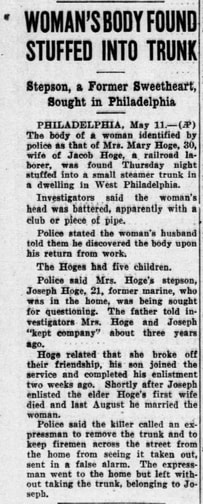 The murder of Mary Hoge ultimately was caused by her cruelty towards her stepchildren c.1934 The murder of Mary Hoge ultimately was caused by her cruelty towards her stepchildren c.1934 Margaret Hoge, who was 10 years old, corroborated this story, complaining that her stepmother had beat her "unmercifully" several times. Mrs. Augustus Magness, a neighbor whom Mary lived with said, "I feel terrible because I didn't report Mrs. Hoge's treatment of her stepchildren to the police long ago. They used to come to see me, looking starved, and I would give them meals." During the trial Joe Hoge described what happened the day Mary Hoge was killed. At about the dinner hour they argued over her ill-treatment of his eleven-year-old sister. He struck her and rendered her unconscious. Fearing the consequences of having hit her, he killed her with a chisel and stuffed the body into the trunk. On September 6, 1934 Joseph Martin Hoge was sentenced to life imprisonment at Eastern State Penitentiary, after having pled guilty to murder in the first degree. By 1940, he was an inmate at the Fairview State Hospital for the Criminally Insane. He was still there in 1950, and he died in 1961 at the age of 48. His father Jacob died in 1958. Was Joe Hoge a cold-blooded killer who murdered his stepmother over being spurned and to steal money? Or was it an argument that escalated when a young man defended his siblings, especially a young sister that was being abused? Was it true that even Jacob Hoge feared his new wife, so much so he couldn't safeguard his own children? Did she get her just desserts for being a greedy, wicked stepmother? Source - The Philadelphia Inquirer, The Miami News, The Morning Call
0 Comments
Your comment will be posted after it is approved.
Leave a Reply. |
Stranger Than Fiction StoriesM.P. PellicerAuthor, Narrator and Producer Archives
July 2024
Categories
All
|
Stories of the Supernatural
- Stories of the Supernatural
- Miami Ghost Chronicles
- M.P. Pellicer | Author
- Stranger Than Fiction Stories
- Eerie News
- Supernatural Storytime
-
Astrology Today
- Tarot
- Horoscope
- Zodiac
-
Haunted Places
- Animal Hauntings
- Belleview Biltmore Hotel
- Bobby Mackey's Honky Tonk
- Brookdale Lodge
- Chacachacare Island
- Coral Castle
- Drayton Hall Plantation
- Jonathan Dickinson State Park
- Kreischer Mansion
- Miami Biltmore Hotel
- Miami Forgotten Properties
- Myrtles Plantation
- Pinewood Cemetery
- Rolling Hills Asylum
- St. Ann's Retreat
- Stranahan Cromartie House
- The Devil Tree
- Trans-Allegheny Lunatic Asylum
- West Virginia Penitentiary
- Paranormal Podcasts
"When misguided public opinion honors what is despicable and despises what is honorable, punishes virtue and rewards vice, encourages what is harmful and discourages what is useful, applauds falsehood and smothers truth under indifference or insult, a nation turns its back on progress and can be restored only by the terrible lessons of catastrophe."
- Frederic Bastiat
- Frederic Bastiat

Copyright © 2009-2024 Eleventh Hour LLC. All Rights Reserved ®
DISCLAIMER
DISCLAIMER
 RSS Feed
RSS Feed


